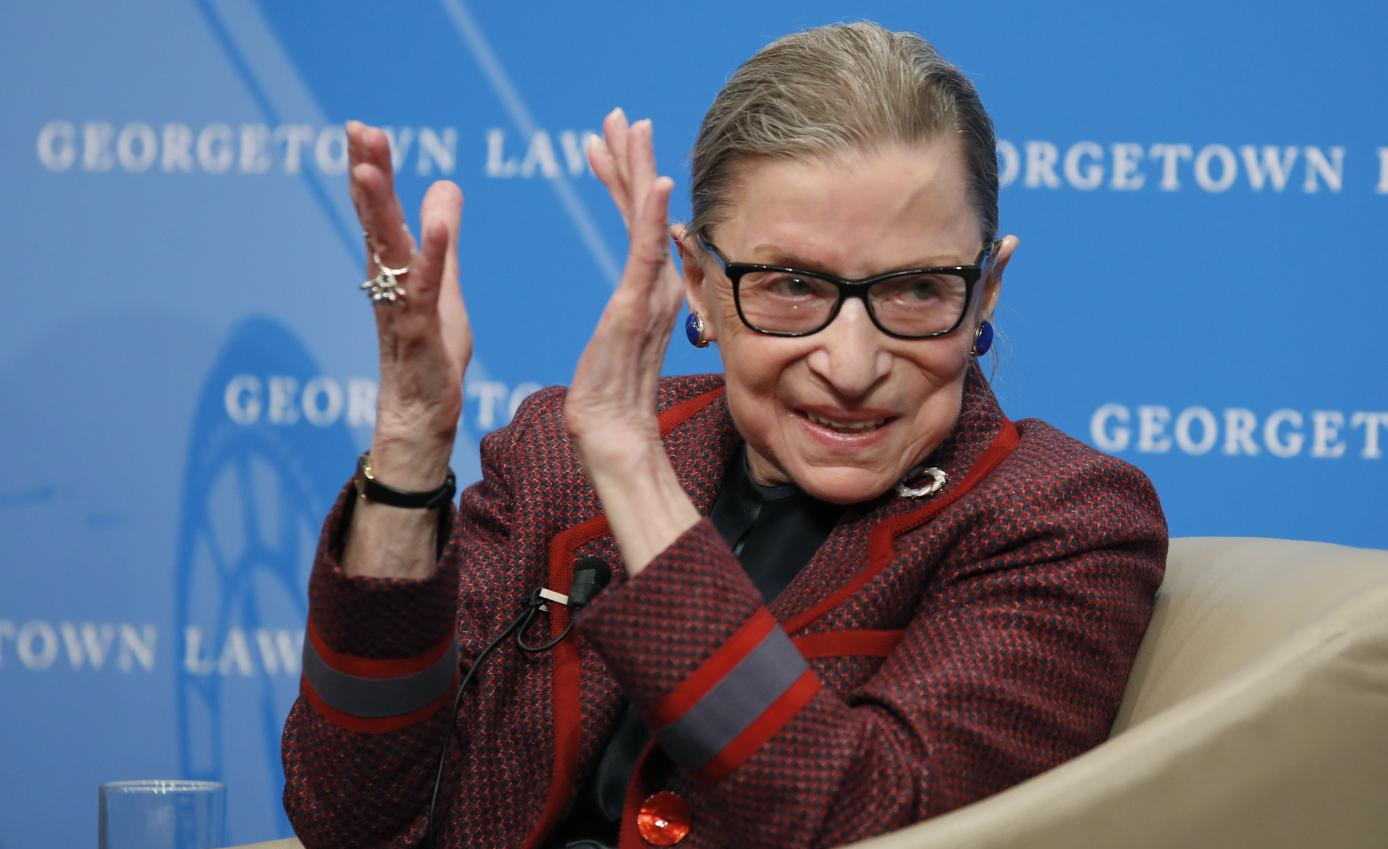2 NATIONAL/CAMPUS
September 22, 2020
Supreme Court Justice Ruth Bader Ginsburg dies at 87
Photo Associated Press
Supreme Court Justice Ruth Bader Ginsburg applauds after a performance in her honor after she spoke about her life and work during a discussion at Georgetown Law School in Washington in April 2018.
Supreme Court Justice Ruth Bader Ginsburg, a diminutive yet towering women’s rights champion who became the court’s second female justice, died Sept. 18 at her home in Washington. She was 87. Ginsburg died of complications from metastatic pancreatic cancer, the court said. Ginsberg’s death just over six weeks before Election Day is likely to set off a heated battle over whether President Donald Trump should
nominate, and the Republican-led Senate should confirm, her replacement, or if the seat should remain vacant until the outcome of his race against Democrat Joe Biden is known. Ginsburg announced in July that she was undergoing chemotherapy treatment for lesions on her liver, the latest of her several battles with cancer. She spent her final years on the bench as the unquestioned leader of the court’s liberal wing
and became something of a rock star to her admirers. Young women especially seemed to embrace the court’s Jewish grandmother, affectionately calling her the Notorious RBG, for her defense of the rights of women and minorities, and the strength and resilience she displayed in the face of personal loss and health crises. She resisted calls by liberals to retire during Barack Obama’s presidency at a time when
Democrats held the Senate and a replacement with similar views could have been confirmed. Instead, Trump will almost certainly try to push Ginsburg’s successor through the Republican-controlled Senate — and move the conservative court even more to the right. Her appointment by President Bill Clinton in 1993 was the first by a Democrat in 26 years. She initially found a comfortable ideological home somewhere left of center on a conservative court dominated by Republican appointees. Her liberal voice grew stronger the longer she served. Ginsburg authored powerful dissents of her own in cases involving abortion, voting rights and pay discrimination against women. She said some were aimed at swaying the opinions of her fellow judges while others were “an appeal to the intelligence of another day” in the hopes that they would provide guidance to future courts. She wrote memorably in 2013 that the court’s decision to cut out a key part of the federal law that had ensured the voting rights of Black people, Hispanics and other minorities was “like throwing away your umbrella in a rainstorm because you are not getting wet.” Joan Ruth Bader was a mother of two, an opera lover and an intellectual. Born in Brooklyn, New York, in 1933, she was the second daughter in a middle-class family. Ginsburg graduated at the top of her Columbia University law school class in 1959 but could not find a law firm willing to hire her. She had “three strikes against her” — for being Jewish, female and a mother, as she put it in 2007. She married her husband, Martin, in 1954, the year she graduated from Cornell University. She attended Harvard University’s law school but transferred to Columbia when her husband took a law job there. Martin Ginsburg died in 2010. She is survived by two children, Jane and James, and several grandchildren. – The Associated Press
RichlandStudentMedia.com
Chancellor announces plans for spring semester Spring classes will be “mostly online,” according to a districtwide email from Dallas College Chancellor Joe May on Sept. 19. The exception are select specialized courses, which will still take place in-person. Those attending on-campus classes next semester can expect COVID-19 safety measures to continue, including self-reported health checks, deep cleaning of all facilities and adherence to social distancing. “While some aspects of our “normal” lives have resumed, it is clear that this pandemic is far from over, and we must continue on our current course to provide our students with access to a high-quality education,”
said Dallas College Chancellor Joe May. The spring class schedule will ultimately affect ISD schools and their students.
dual-credit courses, P-TECHs and Early College High Schools. This decision will affect the nearing
May says Dallas College will continue to work closely with their ISD partners to align curriculum and safety protocols for high school students who attend
80,000 students attending Dallas College, in addition to ISD partner schools that allow high school students to attend on-campus classes. The Richland campus remains closed
to the public. Current and prospective students can meet with Student Services representatives by appointment. The libraries, select computer labs and in-person tutoring services are also available by appointment, Monday through Friday from 8 a.m. to 5 p.m. Walk-ins are currently not permitted. The Richland Chronicle would like to receive comments from our readers about online teaching for future stories. Letters to the editor, comments and suggestions can be submitted to richlandchronicle@ gmail.com or via our social media pages on Facebook, Instagram and Twitter. We look forward to hearing from you, Richland Student Media Editorial Staff



